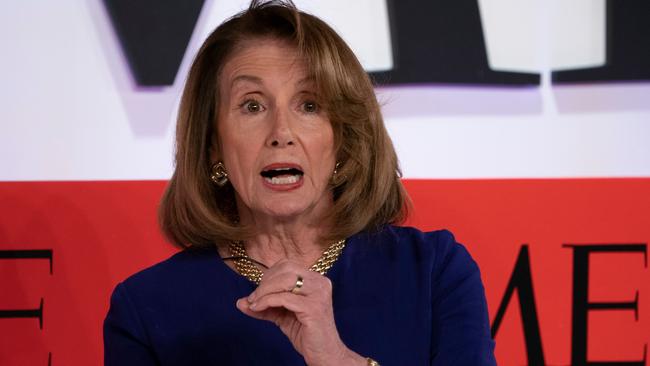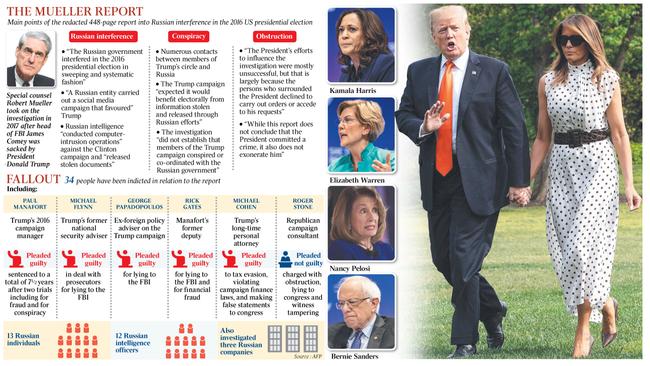The Trump conundrum
The Democrats squabble over the next course to take in the wake of the Mueller report.

Democrats had hoped the release of the full Mueller report would unite them and provide ammunition for their common cause of defeating Donald Trump in next year’s US presidential election.
Instead, special counsel Robert Mueller’s 448-page report on Russian interference in the 2016 election has served only to drive a wedge within the party as members squabble over how to use it to attack the President.
Last week prominent Democratic presidential hopeful Kamala Harris joined fellow contender Elizabeth Warren in calling for the US congress to initiate impeachment proceedings against Trump.
“I believe congress should take the steps toward impeachment,” said Harris, even though she predicted in the same breath that congressional Republicans would defend Trump out of “partisan adherence”. “That does not mean that the process should not take hold. It is very clear that there is a lot of good evidence pointing to obstruction (of justice),” she said.
The Mueller report cleared Trump of any collusion with Russians in the 2016 election and did not find sufficient evidence to recommend charges of obstruction of justice in relation to trying to stymie the Russia probe.

But the full report contained enough examples of the President’s attempts to thwart the investigation to revive the interest of Democrats such as Harris and Warren, who had previously equivocated on the issue of impeachment.
Democrat schism
Warren has framed her call for impeachment as a moral imperative that transcends politics.
“There are a lot of folks who say, ‘This is politically charged, Democrats shouldn’t go here, just stay (away) from it, there’s an election coming up,’ ” she said. “But there are some things that are bigger than politics. If there are people in the house and the Senate who want to say that’s what a president can do … then they should have to take that vote and live with it for the rest of their lives.”
Yet the problem for Harris and Warren — the most prominent female presidential contenders — is that Democratic leaders, led by house Speaker Nancy Pelosi, do not agree. They see impeachment as a potential political trap that will go nowhere and would serve only to strengthen Trump’s argument that he is the victim of a witch-hunt by opponents who refuse to accept Mueller’s findings that he did not commit a crime.
They argue that a better course is to use the Mueller report on the campaign trail as further proof of the President’s character flaws and why he is unfit for a second term.
Politics v facts
Facing a dangerous schism within her party over impeachment, Pelosi held a rare 90-minute phone-hook-up with Democrats last week to thrash out the party’s tactics in a post-Mueller world. Pelosi told Democrats there were ways for the party to hold Trump accountable for his behaviour without pushing for impeachment. She also warned that Americans must not view the party’s actions as being driven by politics over facts.
“We all firmly agree that we should proceed down a path of finding the truth,” Pelosi wrote in a letter to house Democrats. “It is also important to know that the facts regarding holding the President accountable can be gained outside of impeachment hearings. As we proceed to uncover the truth and present additional needed reforms to protect our democracy, we must show the American people we are proceeding free from passion or prejudice, strictly on the presentation of fact.”
The White House has taunted the Democrats for their disunity over impeachment.
“I think it’s quite sad that they’ve got to have a conference call with all of their members to figure out what they’re going to do with themselves now that the Mueller report is out and proven that there was no collusion and no obstruction,” White House press secretary Sarah Sanders said. The split between the Democrats over impeachment is basically one between the party’s moderate pragmatists, who oppose it, and members of its idealistic liberal wing, who wish to make a political statement.
Prominent Democrat Adam Schiff said: “Is it the best thing for the country to take up an impeachment proceeding, because to do otherwise sends a message that this conduct is somehow compatible with the office? Or is it in the best interest of the country not to take up an impeachment that we know will not be successful? That’s a very tough question, and not one to make overnight.”
The Democrats control the House of Representatives but not the Senate. They have the numbers to initiate impeachment proceedings in the house. Trump would then be tried in the Republican-controlled Senate, where a two-thirds majority would be required to convict him and remove him from office.
The Democrats would fall far short of the numbers needed in the Senate to force Trump from office.
Before the release of the report, Pelosi said any move to impeach would have to be bipartisan. “Impeachment is so divisive to the country that unless there’s something so compelling and overwhelming and bipartisan, I don’t think we should go down that path because it divides the country. And he’s just not worth it,” she said.
The Democrats face multiple risks in pursuing impeachment. It would play into the hands of Trump’s support base, allowing him to portray the Democrats as wreckers putting their interests above those of the country. Impeachment proceedings also would distract congress from its legislative responsibilities, guaranteeing that it becomes even more partisan and less effective.
And Democrats would find it difficult to persuade voters they have a moral case to pursue impeachment against a president who has not broken the law.
Impeachment is primarily a political consideration, requiring only that congress agree that a president has committed the vaguely worded offences of “high crimes and misdemeanours”. But Mueller’s exhaustive two-year investigation found Trump guilty of no crime. If Democrats were to pursue impeachment they would struggle to justify why a president who has not committed an indictable crime should be impeached.
Down but not out
Not surprisingly, Trump said last week he was “not even a little bit” worried about impeachment. “If the partisan Dems ever tried to impeach, I would first head to the US Supreme Court,” he tweeted. “There are no ‘High Crimes and Misdemeanours’, there are no crimes by me at all.”
The release of the full Mueller report, which documented numerous examples of Trump’s efforts to stymie the special counsel while falling short of legal culpability, has given Trump a temporary black eye.
Polls show his approval rating has taken a hit since the full report was released on April 18. A Politico/Morning Consult poll last week showed his approval rating dropped five percentage points to only 39 per cent.
However, there is no broad public support to back the calls of Harris, Warren and some other Democrats to impeach.
The same Politico poll found only 34 per cent of voters believe congress should begin impeachment proceedings against the President, down from 39 per cent in January. This is why, for now, those Democrats who oppose impeachment have the upper hand against those who support it such as Harris, Warren and the high-profile young liberal Alexandria Ocasio-Cortez.
Other Democrats running for the White House next year have been more equivocal about impeachment than Harris or Warren. Some, such as Bernie Sanders, point out that the Mueller report is of little relevance to most Americans, who are more concerned about the economy and jobs. He says Democrats should keep their eyes on “issues that concern ordinary Americans”.
Another Democratic presidential contender, moderate senator Amy Klobuchar, says she has not noticed any interest in the Mueller report on the campaign trail.
“I’ve only been asked four questions about the Mueller report and I’ve been asked over 100 questions about healthcare,” she says.
For the Republicans, the full Mueller report chronicles flawed behaviour by the President, but with the exception of Mitt Romney — who said he was “sickened” by the report — no Republican has attacked Trump.
“It’s clear there were no merit badges earned at the White House for behaviour,” Republican senator Cory Gardner said. “You have to focus on the heart of this conclusion, which is there is no collusion, no co-operation. That’s where the focus ought to be.”
Republican Peter King says Trump isn’t perfect but voters know that anyway.
“Is it ideal? Donald Trump is not a saint. Nobody ever said he is,” King told Politico. “But … he never did stop the investigation.”
Top Republicans such as Senate majority leader Mitch McConnell now want to put the Mueller report behind them.
“I think the American people would like to move on from this,” McConnell said last week.
Republican senator Lindsey Graham said: “The Mueller report is over for me. Done.” Graham goaded Democrats to act on calls for impeachment: “You really think he needs to be impeached, have the courage of your conviction: just don’t talk about it, do it.”
But the Democrats are too divided to support or definitively rule out the option of impeachment.
For now, progressives have made it clear they will use their majority in the house to use committees to investigate Trump on a range of fronts, from the Russia probe to his taxes and business affairs.
The White House, emboldened by the Mueller findings that Trump did not break the law, is pushing back aggressively on these probes.
The administration is seeking to fight a house Democrats’ subpoena for former Trump White House counsel Don McGahn to give testimony on the hill.
The Mueller report reveals how Trump asked McGahn in June 2017 to request that Deputy Attorney-General Rod Rosenstein say Mueller had conflicts of interest and couldn’t remain as special counsel. The report says McGahn took notes but did not act on Trump’s request.
But even if McGahn and others mentioned in the Mueller findings do testify to congress, it is difficult to see what they could reveal that was not already covered in Mueller’s exhaustive report.
Progressive pause
The Democrats are at a crossroads. They must decide whether to keep investing time and resources on Trump and Russia, including the potential impeachment Harris and Warren want.
As Sanders put it last week: “What is most important to me is to see that Donald Trump is not re-elected president, and I intend to do everything I can to make sure that doesn’t happen.
“But if for the next year all the congress is talking about is ‘Trump, Trump, Trump’ and ‘Mueller, Mueller, Mueller’ and we’re not talking about healthcare and raising the minimum wage to a living wage and we’re not talking about climate change and sexism and racism and homophobia and the issues that concern ordinary Americans — I worry that works to Trump’s advantage.”
Cameron Stewart is also US contributor for Sky News Australia.




To join the conversation, please log in. Don't have an account? Register
Join the conversation, you are commenting as Logout